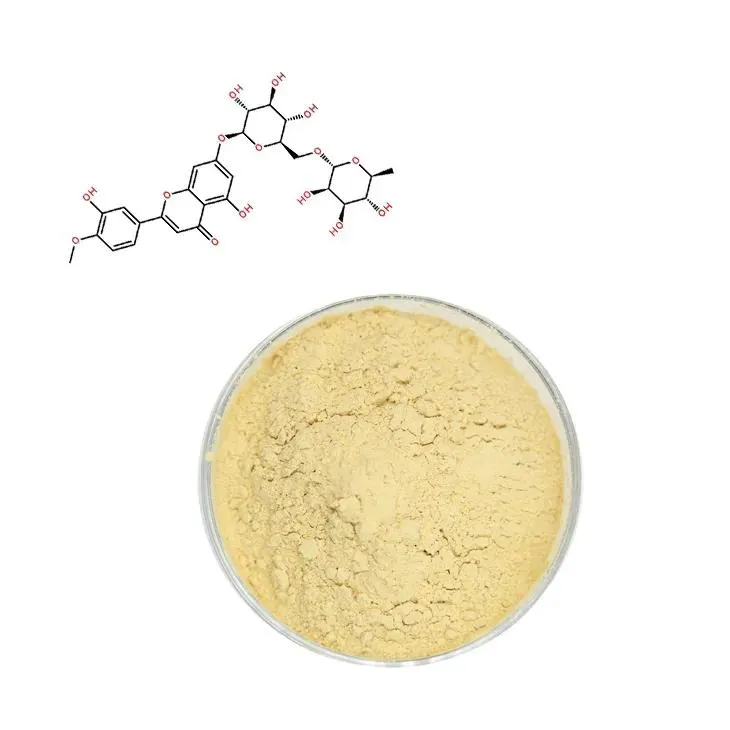- 0086-571-85302990
- sales@greenskybio.com
what is diosmin use for
2025-05-14

Diosmin is a naturally occurring flavonoid predominantly found in citrus fruits. Over the years, it has gained significant attention in the field of healthcare and pharmacology due to its wide-ranging therapeutic properties. As research continues to unveil its benefits, Diosmin is increasingly used in various medical applications, particularly for vascular health and inflammatory conditions. This article provides an in-depth exploration of Diosmin, highlighting its uses, mechanisms of action, and considerations for its incorporation into treatment regimens.
Understanding Diosmin:
Diosmin belongs to a class of compounds known as flavonoids, which are renowned for their antioxidant and anti-inflammatory properties. While the presence of diosmin is most abundant in citrus fruits, it can also be synthesized for pharmaceutical use. Its bioactive nature contributes to several physiological processes, making it a vital agent in addressing various health concerns, particularly those related to the circulatory system.

Key Uses of Diosmin:
1. Venous Insufficiency and Varicose Veins
One of the primary uses of diosmin is in the management of chronic venous insufficiency (CVI) and varicose veins. CVI is a condition characterized by the impaired flow of blood through the veins, leading to symptoms such as swelling, pain, and heaviness in the legs. Diosmin helps alleviate these symptoms by enhancing venous tone, reducing inflammation, and improving blood flow.
The mechanism involves strengthening the walls of blood vessels, reducing their permeability, and minimizing the risk of capillary hyperpermeability. Consequently, diosmin helps prevent edema and enhances the return of blood to the heart, making it a popular choice in the treatment of varicose veins.
2. Hemorrhoid Treatment
Diosmin is frequently used in the treatment of hemorrhoids, which involves the swelling of veins in the rectal area. This condition can be painful and uncomfortable, often requiring medical intervention. Due to its anti-inflammatory properties and ability to improve vascular function, diosmin effectively reduces symptoms such as pain, bleeding, and swelling associated with hemorrhoids.
Research indicates that diosmin, often combined with Hesperidin (another citrus flavonoid), can accelerate healing and provide lasting relief from hemorrhoidal symptoms, offering a non-invasive treatment option for patients.
3. Lymphedema
Patients with lymphedema, which involves the blockage of the lymphatic system leading to significant swelling, may benefit from diosmin. Its ability to reduce capillary permeability and improve the movement of lymph fluid contributes to the alleviation of swelling and associated discomfort. Diosmin's favorable impact on microcirculation is key in managing lymphedema, offering relief and improving the quality of life for affected individuals.
4. Anti-inflammatory and Antioxidant Effects
Beyond vascular health, diosmin's robust anti-inflammatory and antioxidant properties make it a valuable agent in combating systemic inflammation and oxidative stress. As a result, diosmin is being researched for potential applications in treating inflammatory conditions such as arthritis and venous leg ulcers, as well as for protective effects against oxidative damage, which is implicated in various chronic diseases.
Mechanisms of Action:
Diosmin operates through multiple pathways to exert its therapeutic effects:
- Enhancing Venous Tone: Diosmin strengthens venous walls and valves, promoting improved blood flow and venous return, which is crucial for managing varicose veins and hemorrhoids.
- Reducing Capillary Permeability: By decreasing capillary permeability, diosmin helps prevent edema and fluid accumulation, thereby reducing swelling and discomfort.
- Anti-inflammatory Pathways: Diosmin inhibits pro-inflammatory mediators, contributing to reduced inflammation and symptomatic relief in conditions like hemorrhoids and lymphedema.
- Antioxidant Defense: By scavenging free radicals, diosmin protects cells from oxidative damage, offering protective benefits in chronic disease prevention.
Considerations and Safety:
Diosmin is generally well-tolerated, with minimal side effects. However, it is essential to consider certain factors before incorporating diosmin into therapeutic regimens:
- Dosage and Administration: The appropriate dosage of diosmin depends on the condition being treated. It is often available in combination with Hesperidin or in standalone formulations, with adherence to recommended dosages essential for efficacy and safety.
- Pregnancy and Breastfeeding: As with any therapeutic agent, pregnant and breastfeeding individuals should consult healthcare professionals before using diosmin to ensure safety.
- Contraindications: Individuals with specific allergies or those who experience adverse reactions should discontinue use and seek medical advice.
Conclusion:
Diosmin's diverse applications in modern medicine underscore its importance as a therapeutic agent, particularly for vascular health and inflammatory conditions. By enhancing venous tone, reducing inflammation, and offering antioxidant protection, diosmin provides relief and improves quality of life for individuals with venous insufficiency, hemorrhoids, and lymphedema. As research continues to expand its scope of benefits, diosmin is poised to remain integral in evidence-based treatment approaches, providing a natural and effective option for managing various health concerns. Moreover, its favorable safety profile and multifaceted action make diosmin a valuable addition to both conventional and complementary medicine practices, emphasizing the potential of nature-derived solutions for optimal health outcomes.
- ▶ Hesperidin
- ▶ Citrus Bioflavonoids
- ▶ Plant Extract
- ▶ lycopene
- ▶ Diosmin
- ▶ Grape seed extract
- ▶ Sea buckthorn Juice Powder
- ▶ Fruit Juice Powder
- ▶ Hops Extract
- ▶ Artichoke Extract
- ▶ Mushroom extract
- ▶ Astaxanthin
- ▶ Green Tea Extract
- ▶ Curcumin
- ▶ Horse Chestnut Extract
- ▶ Other Product
- ▶ Boswellia Serrata Extract
- ▶ Resveratrol
- ▶ Marigold Extract
- ▶ Grape Leaf Extract
- ▶ New Product
- ▶ Aminolevulinic acid
- ▶ Cranberry Extract
- ▶ Red Yeast Rice
- ▶ Red Wine Extract
-
Berberis aristata Extract
2025-05-14
-
Phyllanthus Emblica Extract
2025-05-14
-
Passionflower Extract
2025-05-14
-
Reishi mushroom extract
2025-05-14
-
Curcumin Extract
2025-05-14
-
Yam Extract
2025-05-14
-
Milk Thistle Extract
2025-05-14
-
Wheat Germ Extract
2025-05-14
-
Quercetin
2025-05-14
-
Jujube Extract
2025-05-14





















